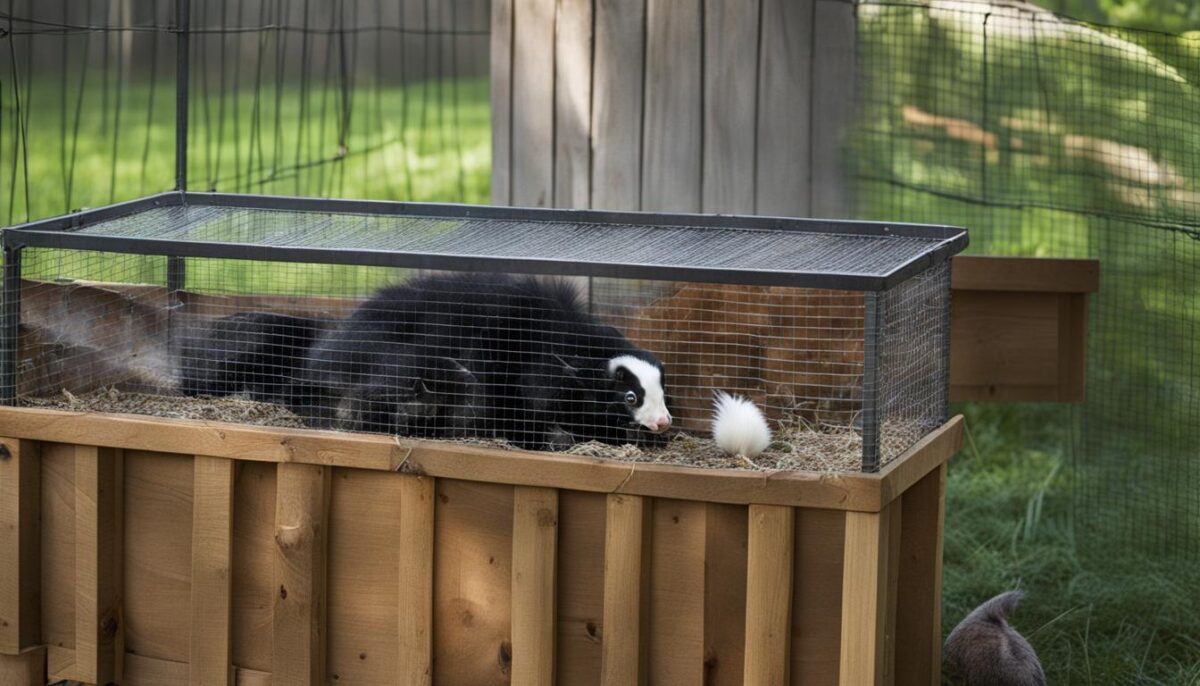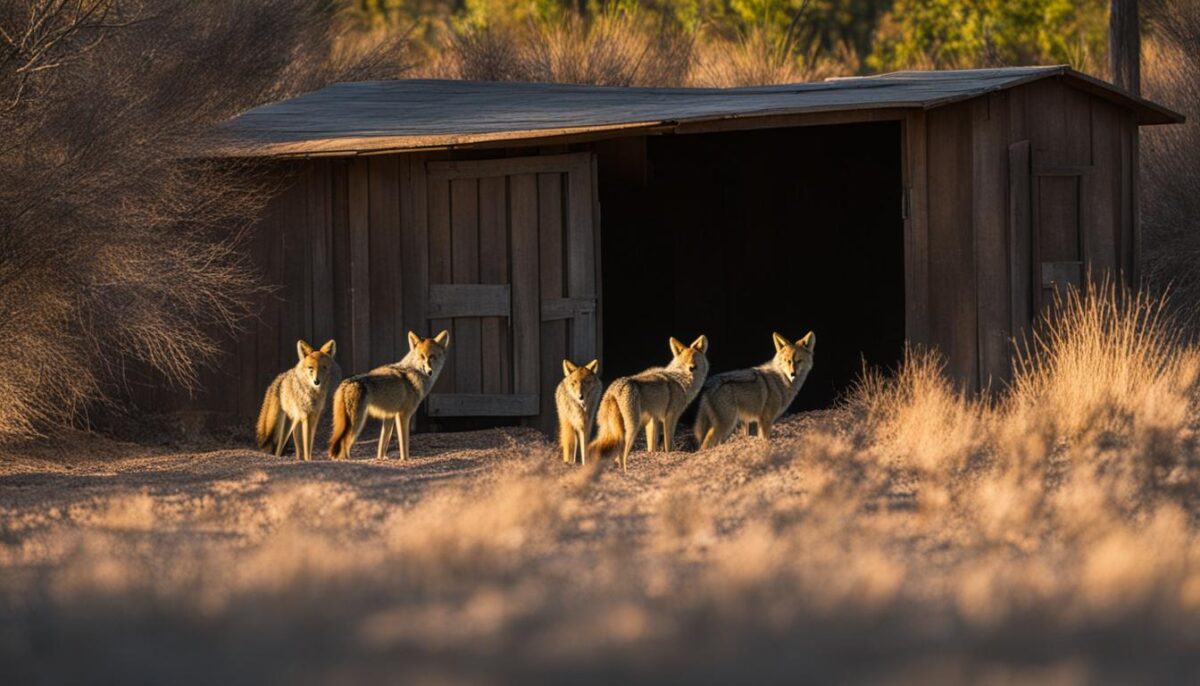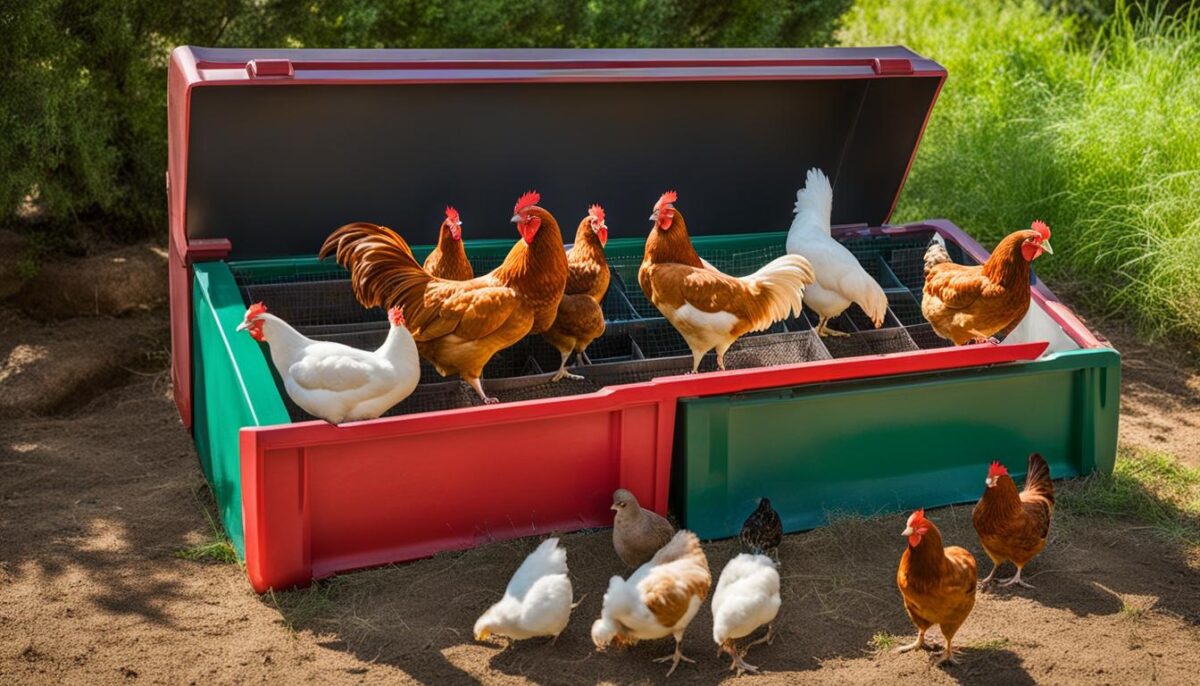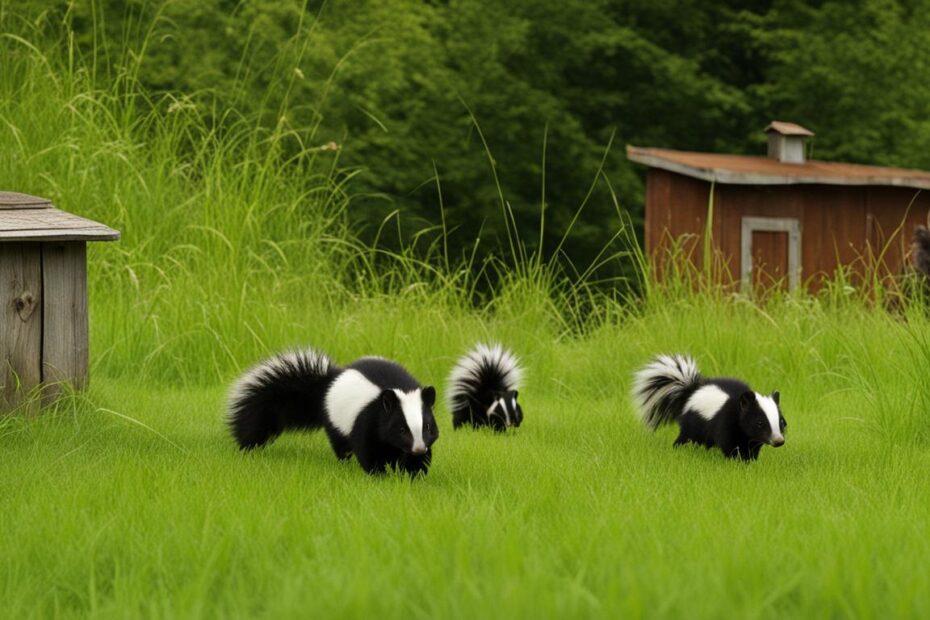Skunks are fascinating creatures with a unique set of behaviors. One common concern that chicken keepers often have is whether skunks pose a threat to their poultry. In this article, we will explore the question: do skunks kill chickens? We will provide you with the facts you need to know and offer effective prevention methods to keep your chickens safe.
Key Takeaways:
- Skunks are omnivores and may attack chickens for eggs or food.
- They have sharp claws that can cause severe damage to chickens.
- Secure fencing, coop structures, and proper food storage are essential to protect chickens from skunks.
- Using natural deterrents such as cayenne pepper or ammonia can help keep skunks away from chicken runs.
- Understanding other predator threats and implementing overall predator prevention strategies is crucial for chicken safety.
Ways to Make Money by Chicken Farming
Do Skunks Kill Chickens
Understanding Skunk Behavior Around Chickens
Skunks are opportunistic predators and their behavior around chickens can vary depending on their circumstances. While skunks are not typically known to go out of their way to kill chickens for food, they may target chickens if they are hungry enough or if they perceive a threat to their eggs. Understanding skunk behavior can help chicken keepers take appropriate measures to protect their flock.
One common reason skunks may attack chickens is to access their eggs. Skunks are known to be attracted to chicken coops because they see them as a potential food source. They have the ability to dig and climb, which means they can find ways to access nests and steal eggs. Skunks may also attack chickens directly if they feel threatened or if they want to prevent the chickens from accessing the eggs. how to protect chickens from skunk
To prevent skunks from targeting chickens, it is important to have secure fencing and coop structures. Skunks can easily dig under or climb over weak or loose fencing, so using sturdy materials like hardware cloth or mesh wire can help deter them. Coops should be solid-sided to prevent skunks from reaching inside, and all openings should be properly sealed. Implementing these prevention methods can significantly reduce the risk of skunk attacks on chickens.
Table:
| Skunk Behavior | Implications for Chickens |
|---|---|
| Opportunistic predators | May target chickens if hungry or to access eggs |
| Ability to dig and climb | Can find ways to access nests and steal eggs |
| Attracted to chicken coops | See them as a potential food source |
| May attack if threatened | Directly target chickens to prevent access to eggs |
Signs of Skunk Attacks on Chickens
When skunks attack chickens, there are several signs to look out for. These signs can help you identify if your chickens have been targeted by skunks and take appropriate action to protect them. Some common signs of skunk attacks on chickens include:
- Scattered feathers: Skunks are known to leave behind a trail of feathers after attacking chickens.
- Footprints: Look for skunk footprints around the chicken coop or in the area where the attack occurred.
- Missing or cracked eggs: Skunks may target chickens to access their eggs, so if you find eggs that are missing or cracked, it could be a sign of a skunk attack. prevent skunk predation on chickens
In addition to these signs, skunks may leave behind a distinct odor that lingers in the vicinity of the chicken coop. It is important to be vigilant and regularly inspect the coop for any signs of skunk attacks. Taking prompt action can help protect your chickens from further harm.
| Signs of Skunk Attacks on Chickens | Action |
|---|---|
| Scattered feathers | Inspect the coop for any gaps or openings where skunks may have gained access. Consider reinforcing the coop’s structure. |
| Footprints | Set up motion-activated cameras or traps to capture images of any skunks in the area. This can help identify the size and number of skunks involved. |
| Missing or cracked eggs | Collect and discard any damaged eggs. Implement measures to secure the nest and protect the remaining eggs. |
By being aware of these signs and taking appropriate measures, you can help safeguard your chickens from skunk attacks and minimize the risks to your flock. how to protect chickens from skunks
Protecting Chickens from Skunks: Effective Prevention Methods
Skunks can pose a threat to chickens, but there are several effective prevention methods that can help protect your flock. By implementing these strategies, you can minimize the risk of skunk predation and ensure the safety of your chickens.
“Skunks have long and sharp claws that can cause serious damage to chickens.”
One of the most important steps in protecting chickens from skunks is to have secure fencing around the coop area. Use chicken wire with small openings to prevent skunks from reaching through. Additionally, electric poultry fencing can be an effective deterrent. Ensure that the coop is solid-sided to prevent skunks from reaching inside. To further prevent skunks from tunneling under the coop, consider adding a ground apron or burying mesh around the perimeter. skunk deterrents for chicken coops
- Secure the coop at night: Skunks are most active during the night, so make sure to secure the coop with sturdy latches to prevent skunks from gaining access.
- Minimize food sources: Remove any potential food sources that may attract skunks, such as spilled chicken feed or food scraps.
- Skunk deterrents: Consider using natural deterrents around the coop area, such as sprinkling cayenne pepper or ammonia, which skunks dislike.
Table: Comparison of Skunk Prevention Methods
| Prevention Method | Effectiveness | Cost |
|---|---|---|
| Secure fencing | High | Medium |
| Electric poultry fencing | High | High |
| Ground apron or buried mesh | High | Low |
| Skunk deterrents | Medium | Low |
Implementing these prevention methods can significantly reduce the chances of a skunk attack on your chickens. By taking proactive measures to protect your flock, you can create a safe and secure environment for your chickens to thrive in. securing chicken coops from skunks

Skunk Deterrents: Repelling Skunks from Chicken Runs
When it comes to protecting your chickens from skunks, there are several natural deterrents that can help repel these unwanted visitors from your chicken runs. skunk behavior around chickens
One effective method is to sprinkle cayenne pepper or ammonia around the perimeter of the chicken run. Skunks dislike the smell of these substances and are likely to be deterred from entering the area. However, it’s important to note that these deterrents may need to be reapplied regularly to maintain their effectiveness. minimizing skunk-chicken conflicts
Another option is to strategically place motion-activated lights or sprinklers near the coop. Skunks are nocturnal animals, so the sudden activation of these devices can startle and discourage them from approaching. This provides an extra layer of protection for your chickens during the night.
Additionally, keeping the area around the chicken run clean and free of food scraps can help reduce the likelihood of skunk visits. Skunks are attracted to available food sources, so minimizing their access to these resources can make your chicken run less appealing to them.
“Skunks dislike the smell of cayenne pepper and ammonia, making them effective natural deterrents.” – Chicken Keeper Magazine
In summary, repelling skunks from chicken runs can be achieved through the use of natural deterrents such as cayenne pepper and ammonia, as well as the placement of motion-activated lights or sprinklers. Keeping the area clean and free of food scraps can also help reduce the attractiveness of your chicken run to skunks.
| Deterrent Method | Effectiveness |
|---|---|
| Cayenne pepper and ammonia | Highly effective |
| Motion-activated lights or sprinklers | Moderately effective |
| Cleanliness and food management | Moderately effective |
Securing Chicken Coops: Skunk-Proofing Tips
Skunks can be a nuisance for chicken owners, but there are several effective methods to skunk-proof your chicken coop and keep your feathered friends safe. By following these tips, you can minimize the risk of skunk attacks and ensure the security of your chickens.
Table: Skunk-Proofing Tips for Chicken Coops
| Skunk-Proofing Method | Description |
|---|---|
| Use sturdy materials | Cover any openings with hardware cloth or mesh wire to prevent skunks from entering the coop. |
| Secure coop doors | Ensure coop doors have latches that skunks cannot easily open. |
| Regular inspections | Regularly inspect the coop for any holes or gaps that may allow skunks to enter. |
| Bury wire mesh | Prevent skunks from digging under the coop by burying wire mesh around the perimeter. |
Using sturdy materials to cover any openings in your coop is crucial for skunk-proofing. Hardware cloth or mesh wire is recommended as it can effectively keep skunks out while allowing proper ventilation for your chickens. Additionally, make sure that your coop doors have secure latches that skunks cannot easily open.
Regular inspections of your chicken coop are essential to identify and fix any holes or gaps that may serve as entry points for skunks. Conduct a thorough check of the coop, paying close attention to areas where skunks may try to squeeze in. By addressing any potential vulnerabilities, you can significantly reduce the chances of skunks infiltrating your coop.
An effective method to prevent skunks from tunneling under your coop is to bury wire mesh around its perimeter. This creates a barrier that skunks cannot dig through. Ensure that the mesh is buried deep enough to deter skunks and secure the coop from underground entry.
By implementing these skunk-proofing tips, you can safeguard your chicken coop and protect your chickens from potential skunk attacks. Remember to regularly inspect and maintain your coop to ensure its integrity and security. With these preventative measures in place, you can create a safe and comfortable environment for your feathered friends.
Understanding Other Predator Threats to Chickens
While skunks can pose a threat to chickens, it is important to be aware of other predator threats as well. Dogs, coyotes, foxes, birds of prey, and opossums are some of the common predators that can target chickens. Each predator has its own hunting and feeding behaviors that can impact the safety of the flock. Understanding these threats and taking measures to protect against them is crucial for the well-being of chickens and the success of poultry keeping.
Dogs, both domestic and feral, can pose a significant threat to chickens. They are natural predators and may attack chickens out of instinct or curiosity. It is important to keep dogs properly restrained and away from the chicken coop to prevent any incidents. Placing secure fencing around the coop can help create a physical barrier and deter dogs from approaching the chickens.
Coyotes and foxes are highly skilled hunters and can be a major concern for chicken keepers. These predators are known for their ability to dig under fences and find ways to access the coop. Reinforcing fencing with buried wire mesh and regularly inspecting for any gaps or weak points can help prevent these predators from getting to the chickens.
Quote: “Birds of prey, such as hawks and owls, are another potential threat to chickens. They have keen eyesight and are quick to spot potential prey. Raising the roof of the chicken run or using netting can help protect chickens from aerial attacks.”
Opossums are opportunistic scavengers that can pose a threat to chickens, especially during nighttime. They may be attracted to the smell of food or the sounds of chickens and attempt to access the coop. Ensuring that the coop is secure at night and removing any food sources can help reduce the risk of opossum encounters.
By understanding these other predator threats and implementing appropriate preventive measures, chicken keepers can create a safer environment for their chickens. Combining secure fencing, diligent coop maintenance, and strategies tailored to specific predators can significantly reduce the likelihood of predation.

Preventing Predation: Tips for Overall Chicken Safety
When it comes to protecting your chickens from predators, there are several key strategies you can implement to ensure their safety. By following these tips, you can minimize the risk of predation and create a secure environment for your feathered friends.
1. Build a Strong Fence
A sturdy and well-built fence is crucial for keeping predators out of your chicken coop area. Use chicken wire with small openings to prevent skunks and other small predators from squeezing through. Additionally, consider using electric poultry fencing for added security. Make sure the fence extends into the ground to prevent digging attempts by predators.
2. Reinforce Coop Security
Ensure that your chicken coop is secure and predator-proof. Use solid-sided construction to prevent skunks from reaching in or burrowing under. Regularly check for any holes or gaps in the coop and promptly repair them. Install secure latches on doors to prevent predators from gaining access. At night, make sure the coop is tightly sealed to keep predators out.
3. Remove Attractants
To deter predators from targeting your chickens, remove any attractants that might draw them in. Keep the area around the coop clean and free of food scraps. Properly store chicken feed in predator-proof containers to avoid attracting opportunistic predators. By minimizing attractants, you can reduce the likelihood of predators visiting your coop.
In conclusion, protecting your chickens from predators requires a combination of physical barriers, secure housing, and minimizing attractants. By implementing these preventative measures, you can create a safe and secure environment for your flock. Remember to regularly inspect and maintain your fencing and coop to ensure their effectiveness. With these strategies in place, you can enjoy the benefits of raising chickens while keeping them safe from predators.
| Predator Prevention Tips | Key Actions |
|---|---|
| Build a Strong Fence | Use chicken wire with small openings and consider electric poultry fencing. Ensure the fence extends into the ground to prevent digging. |
| Reinforce Coop Security | Use solid-sided construction, regularly inspect for holes or gaps, and install secure latches on doors. |
| Remove Attractants | Keep the area around the coop clean, free of food scraps, and store chicken feed properly. |

Conclusion
In conclusion, skunks can pose a threat to chickens, particularly when they are hungry or seeking access to eggs. Understanding skunk behavior and signs of skunk attacks is crucial for chicken keepers to protect their flock.
To safeguard chickens from skunks, it is essential to implement effective prevention methods. This includes securing coops with sturdy fencing, using deterrents like sprinkling cayenne pepper or ammonia around the perimeter, and keeping the area clean to reduce skunk attractants.
Additionally, skunk-proofing chicken coops by covering any openings with hardware cloth or mesh wire, and regularly inspecting the coop for holes or gaps, can help prevent skunks from entering. By implementing these strategies and overall predator prevention measures, chicken keepers can minimize the risks of skunk predation and ensure the safety of their flock.
FAQ
Do skunks kill chickens?
Skunks may attack chickens for two reasons – to access their eggs or if they are hungry enough for food. They have sharp claws that can cause serious damage to chickens.
What are the signs of skunk attacks on chickens?
Signs of skunk attacks on chickens may include scattered feathers, footprints, missing or cracked eggs, a distinct odor, and wounded chickens surviving an attack.
How can I protect my chickens from skunks?
To protect chickens from skunks, it is important to have secure fencing around the coop area, use chicken wire or electric poultry fencing, ensure solid-sided coops, and minimize food sources that may attract skunks.
What are some natural skunk deterrents for chicken runs?
Sprinkling cayenne pepper or ammonia around the perimeter, using motion-activated lights or sprinklers, and keeping the area clean of food scraps can help repel skunks from chicken runs.
How can I skunk-proof my chicken coop?
Skunk-proofing a chicken coop involves using sturdy materials to cover openings, securing coop doors with latches, regularly inspecting for holes or gaps, and burying wire mesh around the perimeter to prevent skunks from digging under.
What other predator threats should I be aware of?
Other predator threats to chickens include dogs, coyotes, foxes, birds of prey, and opossums. Each predator may have its own hunting and feeding behaviors that can impact chickens.
How can I prevent predation and ensure overall chicken safety?
Good fencing, secure housing at night, clearing the area around the coop, and minimizing attractants such as food scraps can help prevent predation and ensure overall chicken safety.
What legal considerations should I be aware of for predator control?
Killing or trapping certain predator species may be illegal. If you are experiencing ongoing issues with predators, it is recommended to contact USDA Wildlife Services for assistance and guidance.
Are there resources available for chicken keepers to learn about predator prevention?
Yes, there are guides on skunk removal, predator-proofing chicken coops, and general poultry health and management. The UNH Extension Infoline also provides practical help for questions related to poultry and wildlife management.


